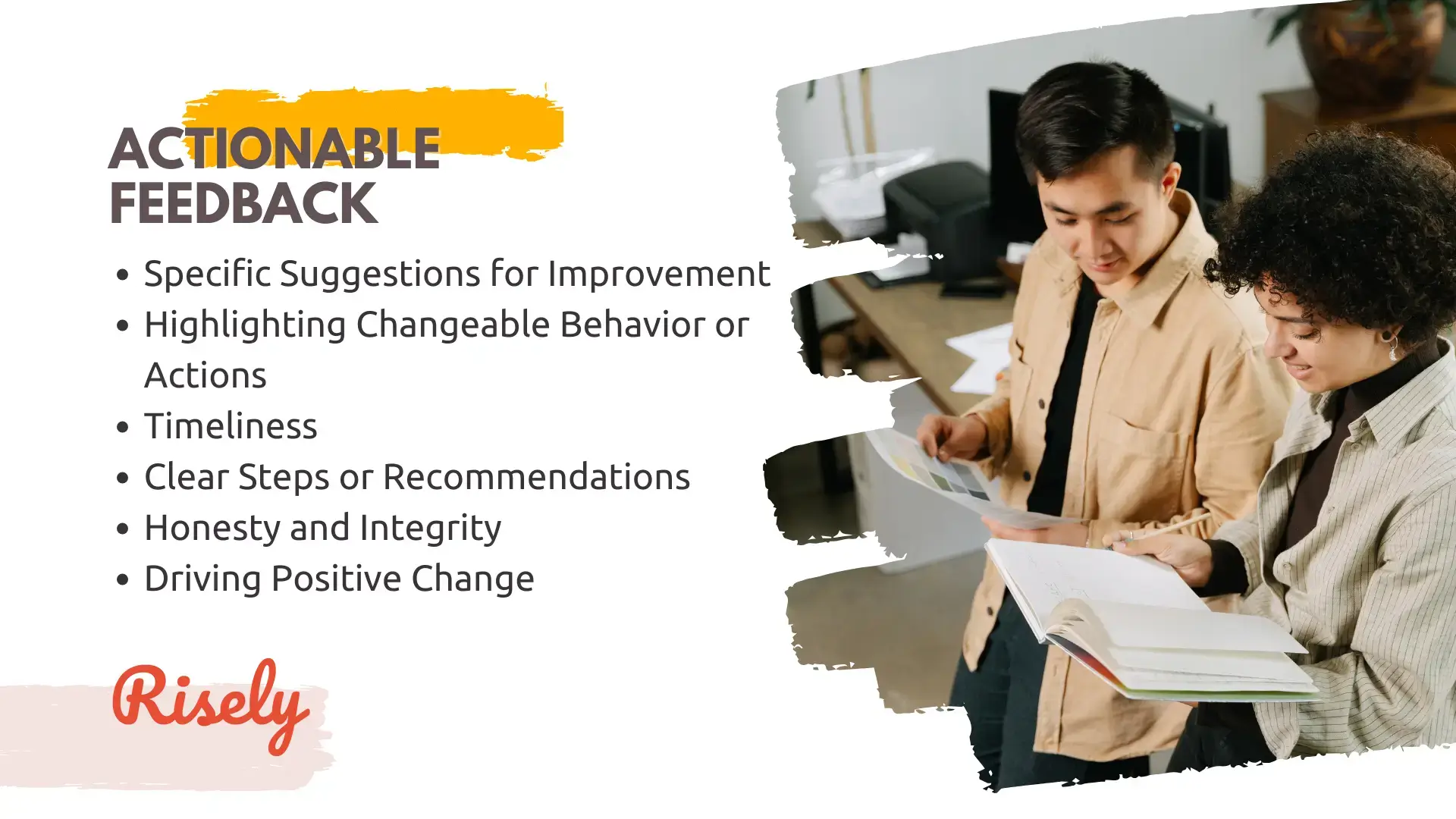Your Team Needs Actionable Feedback: 5 Ways to do it right
As a manager, giving feedback to your team is an essential part of your role. But what sets actionable feedback apart from the typical feedback you might give? Actionable feedback is specific, clear, and targeted towards behavior rather than personality. It has a measurable impact on the team’s performance and fosters professional growth for individual members. In short, actionable feedback is vital in enhancing your team’s efficiency. This blog post will discuss five effective strategies for making your feedback actionable. We will also explore how providing actionable feedback can contribute to successful team management by strengthening team efficiency, fostering professional growth, and improving delegation within the team. Finally, we will provide a framework for managers to use when providing actionable feedback to their teams.What is Actionable Feedback?
Actionable feedback provides specific and practical suggestions for improvement or action. It goes beyond simply pointing out areas of weakness or areas that need improvement and offers concrete steps or recommendations for addressing those issues. Actionable feedback is valuable because it helps the recipient understand what needs improvement and how to go about it. It guides them towards taking specific actions that can lead to positive change and growth. You can empower others to make meaningful improvements and achieve their goals by providing actionable feedback.Examples of Actionable Feedback
Example 1
Non-Actionable Feedback Example: “You need to be more creative.”- This feedback is non-actionable because it is vague and subjective. It doesn’t specify what aspect of creativity needs improvement or offer practical suggestions.
- This feedback is actionable because it identifies a specific area for improvement (incorporating visual elements) and provides a clear suggestion for achieving it (using charts or diagrams). It offers a practical step for the recipient to enhance their creativity.
Example 2
Non-Actionable Feedback Example: “You need to improve your teamwork.”- This feedback is non-actionable because it lacks specificity and doesn’t specify what aspect of teamwork requires improvement or how to go about it.
- This feedback is actionable because it identifies a specific behavior (active listening and providing constructive input) that can enhance teamwork. It also guides how to improve, contributing to a more actionable response.
Characteristics of Actionable Feedback
- Specific Suggestions for Improvement: Actionable feedback should offer straightforward, detailed suggestions for improvement. Instead of vague or general comments, it should pinpoint behaviors, actions, or areas that can be changed or enhanced.
- Highlighting Changeable Behavior or Actions: Actionable feedback focuses on behaviors or activities within the recipient’s control. It directs attention to aspects that can be altered or adjusted to achieve improvement.
- Timeliness: Actionable feedback should be given promptly. Addressing the issue in time allows the recipient to make necessary changes while the situation remains relevant and fresh.
- Clear Steps or Recommendations: It should provide clear and actionable steps or recommendations for improvement. This guidance helps the recipient understand what specific actions they can take to address the feedback effectively.
- Honesty and Integrity: Actionable feedback is characterized by honesty and integrity. It is candid and straightforward while maintaining respect and professionalism. Honesty builds trust within a team and encourages open communication.
- Driving Positive Change: The ultimate goal of actionable feedback is to drive positive change. It should inspire recipients to improve, develop their skills, and contribute to personal and professional growth.

The Impact of Actionable Feedback on Teams
Effective feedback plays a crucial role in improving team communication and collaboration. It provides team members with suggestions for improvement, boosting their morale and motivation. By focusing on actionable steps, feedback enhances team performance and productivity. It also fosters a culture of continuous learning and growth within the team, strengthening relationships and trust. In today’s tech-driven world, providing online reviews and great feedback contributes to a positive company culture. Whether positive or critical, honest feedback can lead to significant improvements and minimize interruptions.How does actionable feedback differ from typical feedback?
Actionable feedback differs from normal feedback in several ways:- Actionable feedback is specific and provides clear steps for improvement, whereas regular feedback may be vague or general.
- Actionable feedback emphasizes strengths and growth areas, while average feedback often focuses more on what went wrong.
- Actionable feedback is goal-oriented and helps individuals achieve specific objectives, whereas average feedback may lack a clear desired outcome.
Why should managers provide actionable feedback?
Strengthening Team Efficiency
To strengthen team efficiency, providing feedback on time management and prioritization skills is crucial. Encouraging collaboration and effective communication within the team can also significantly enhance efficiency. Setting clear expectations and providing guidance on project deadlines helps team members stay focused and complete tasks efficiently. Recognizing and rewarding efficient and productive work behavior creates a positive work environment. Additionally, offering training or resources to improve efficiency in specific tasks or processes can further boost team productivity.Fostering Professional Growth of Team Members
To foster the professional growth of team members, it is essential to provide feedback on areas where improvement can be made and suggest relevant professional development opportunities. Additionally, offering mentoring or coaching can significantly enhance the skills and knowledge of the individuals in the team. Setting challenging goals and providing support is another effective way to promote professional growth. Team members can further enhance their skills and knowledge by fostering a learning culture and encouraging continuous learning and self-improvement. Finally, recognizing and celebrating individual progress and achievements can motivate team members to strive for constant growth and development.Enhances Delegation in the Team
Encouraging effective delegation within a team can significantly enhance its performance. Providing feedback on delegation skills and decision-making processes helps team members improve their ability to assign tasks based on individual strengths and expertise. Team members can collaborate more efficiently by promoting open communication and feedback during delegation. Offering training or resources on effective delegation techniques equips them with the necessary tools for successful task allocation. Recognizing and rewarding successful delegation efforts and outcomes motivates and empowers the team.Other Interesting Reads
Making Feedback Actionable: 5 Effective Strategies
Be Specific and Clear
When providing feedback, it is crucial to be specific and clear. Clearly outline the particular actions or behaviors that need improvement, and provide specific examples to illustrate your point. Avoid vague or general statements that may confuse the recipient. Use objective language to ensure clarity and understanding. Make sure your feedback is actionable and can be implemented effectively. By being specific and transparent in your feedback, you provide the necessary guidance for improvement and promote growth within your team.Focus on Behaviour, not the Person
When providing feedback to team members, focusing on the specific behavior or action that needs improvement rather than attacking the person is essential. Separating the individual from their actions can promote a more constructive conversation that encourages self-reflection and growth. Using non-judgmental language that focuses on observable actions allows for honest feedback without shaming or blaming. Additionally, emphasizing the impact of the behavior on the team or project highlights the importance of change.Offer a Path Forward
To offer a path forward, providing suggestions and recommendations for improvement is crucial. By delivering actionable steps or strategies to address the highlighted issues, you empower individuals to take ownership of their development and growth. It is essential to collaborate with them to create a plan of action and provide the necessary resources or support to assist in their improvement journey. By doing so, you facilitate their progress and contribute to a positive company culture. Encourage open dialogue and regularly provide feedback to promote continuous improvement. Read more: The Power of Performance Improvement Plans: A Roadmap to ProgressEncourage Open Dialogue
Encouraging open dialogue is crucial for creating a safe and non-threatening environment for effective feedback. It involves fostering a culture of continuous feedback and discussion within the team. By actively listening and empathetically considering the recipient’s perspective, HR, and managers can create an atmosphere where positive and honest feedback can thrive. Furthermore, asking for the recipient’s input and ideas for improvement promotes engagement and ownership. Through open dialogue, teams can constructively address critical feedback, negative comments, and interruptions, fostering a company culture of growth and excellent feedback.Regularly Provide Feedback
To ensure effective feedback:- Make it a regular part of your communication and management style.
- Strive for a balance between positive and constructive feedback, maintaining a supportive and honest approach.
- Schedule regular check-ins to discuss progress and address any concerns.
- Utilize various feedback methods such as one-on-one meetings, performance reviews, or online platforms to gather insights.
- Continuously monitor and evaluate performance, providing timely and honest feedback to foster growth and improvement.
Skills in Focus
Ensuring effective feedback is essential for teams. But how do managers achieve this? The key lies in building two essential skills:- Constructive Feedback: Constructive feedback adopts healthy feedback practices that encourage growth and development for the recipients. It makes feedback a two-way process that focuses on individual and team growth.
- One-on-One Meetings: One-on-one meetings are the bedrock of frank conversations between employees and their managers to concentrate on development. They offer a chance to discuss concerns that might get skipped in routine performance reviews due to rigid systems and hesitation.
Conclusion
Providing actionable feedback is crucial for the growth and success of your team. It helps strengthen team efficiency, foster professional development, and enhance delegation. You can make feedback more actionable and impactful by being specific and precise, focusing on behavior rather than the person, offering a path forward, encouraging open dialogue, and regularly providing feedback. It creates a culture of continuous improvement and drives better results. In conclusion, actionable feedback is not just about pointing out mistakes; it’s about providing guidance and support to help your team members excel. By implementing these strategies and following the actionable feedback framework, you can contribute to successful team management and create a high-performing and motivated team. Remember, investing in actionable feedback is investing in the growth and development of your team. So, start providing actionable feedback today and watch your team thrive.How strong are your constructive feedback skills?
Take Risely’s constructive feedback assessment for free now and learn more. What’s more? Signing up for free enables you to get your team’s input too!
Other Related Blogs
Assertive Feedback Techniques ft. Gurleen Baruah
Assertive Feedback Techniques ft. Gurleen Baruah Let’s be real—giving feedback as a manager isn’t always easy. Say too little, and nothing changes. Say too much, and it might come off…
How to ask for feedback from employees? | Gurleen Baruah
How to ask for feedback from employees? | Gurleen Baruah Feedback is a two way street. This podcast took managers on a trip down the other side. As managers, we…
Let’s Reverse the Gaze of Radical Candor?
Let’s Reverse the Gaze of Radical Candor? Have you heard about Radical Candor? It’s a book by Kim Scott that first came out in 2017. The tagline is “Caring Personally…
How To Become A Leadership Coach In 5 Steps
How To Become A Leadership Coach In 5 Steps Becoming a leadership coach is a fulfilling and rewarding career path for those who are passionate about helping others develop their…


